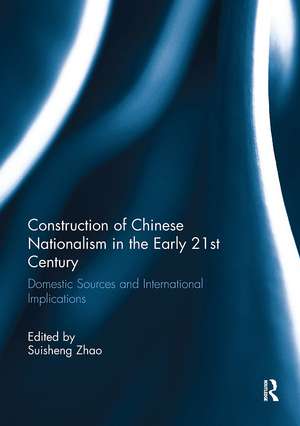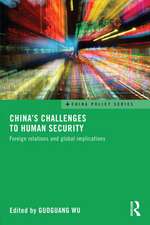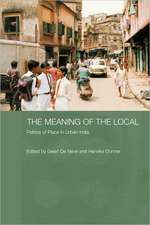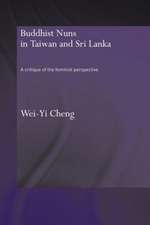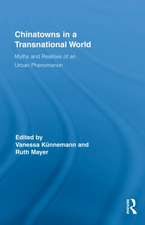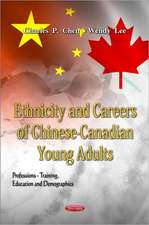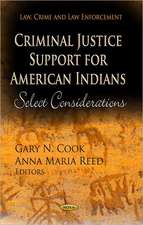Construction of Chinese Nationalism in the Early 21st Century: Domestic Sources and International Implications
Editat de Suisheng Zhaoen Limba Engleză Paperback – 14 oct 2024
It is divided into three parts. Part I is an overview of the scholarly debate about if the rise of Chinese nationalism has driven China’s foreign policy in a more irrational and inflexible direction in the first one and half decades of the 21st century. Part II analyzes the construction of Chinese nationalism by a variety of domestic forces, including the communist state, the angry youth (fen qing), liberal intellectuals, and ethnic groups. Part III explores whether Chinese nationalism is affirmative, assertive, or aggressive through the case studies of China’s maritime territorial disputes with Japan in the East China Sea and with several Southeast Asian countries in the South China Sea, the border controversy over the ancient Koguryo with Korea, and the cross-Taiwan Strait relations.
This book was based on articles published in the Journal of Contemporary China.
| Toate formatele și edițiile | Preț | Express |
|---|---|---|
| Paperback (1) | 260.73 lei 6-8 săpt. | |
| Taylor & Francis – 14 oct 2024 | 260.73 lei 6-8 săpt. | |
| Hardback (1) | 1038.68 lei 3-5 săpt. | +23.80 lei 5-11 zile |
| Taylor & Francis – 30 iun 2014 | 1038.68 lei 3-5 săpt. | +23.80 lei 5-11 zile |
Preț: 260.73 lei
Preț vechi: 304.33 lei
-14% Nou
Puncte Express: 391
Preț estimativ în valută:
49.89€ • 52.22$ • 41.52£
49.89€ • 52.22$ • 41.52£
Carte tipărită la comandă
Livrare economică 31 martie-14 aprilie
Preluare comenzi: 021 569.72.76
Specificații
ISBN-13: 9781032924397
ISBN-10: 103292439X
Pagini: 266
Dimensiuni: 174 x 246 mm
Greutate: 0.49 kg
Ediția:1
Editura: Taylor & Francis
Colecția Routledge
Locul publicării:Oxford, United Kingdom
ISBN-10: 103292439X
Pagini: 266
Dimensiuni: 174 x 246 mm
Greutate: 0.49 kg
Ediția:1
Editura: Taylor & Francis
Colecția Routledge
Locul publicării:Oxford, United Kingdom
Public țintă
AcademicCuprins
Part I: Debating Chinese Nationalism in the early 21st Century 1. Chinese nationalism and its political and social origins 2. Foreign Policy Implications of Chinese Nationalism Revisited: The Strident Turn 3. Reclassifying Chinese Nationalism: The Geopolitik Turn 4. Nationalism, Internationalism and Chinese Foreign Policy Part II: Domestic Sources of Chinese Nationalism: State, Society, and Ethnicity 5. Gaming, Nationalism, and Ideological Work in Contemporary China: Online Games Based on the Resistance War to Japan 6. Fen Qings (Angry Youth) in Contemporary China 7. Nationalism and Democratization in Contemporary China 8. From the Language of Class to the Rhetoric of Development: Discourses of ‘Nationality’ and ‘Ethnicity’ in China 9. Sovereignty, Ethnicity, and Culture: The Tibetan Issue in an Institutionalist Perspective Part III: External Implications of Chinese Nationalism: Case Studies of China’s territorial disputes 10. China’s Assertiveness in the South China Sea 11. History, Chinese Nationalism and the Emerging Sino-Japanese Conflict 12. Domestic Politics, National Identity, and International Conflict: The Case of the Koguryo Controversy 13. Constructing Peace in the Taiwan Strait: A Constructivist Analysis of the Changing Dynamics of Identities and Nationalisms
Notă biografică
Suisheng Zhao is Professor and Director of the Center for China-US Cooperation at Josef Korbel School of International Studies, University of Denver, senior fellow at Chahar Institute and founding editor of the Journal of Contemporary China.
Descriere
This collection of contributions by leading scholars explores how the re-emergence of Chinese nationalism in the 21st century has been driven by a variety of domestic forces, including the communist state, the angry youth (fen qing), liberal intellectuals, and ethnic groups if Chinese nationalism is affirmative, assertive, or aggressi
